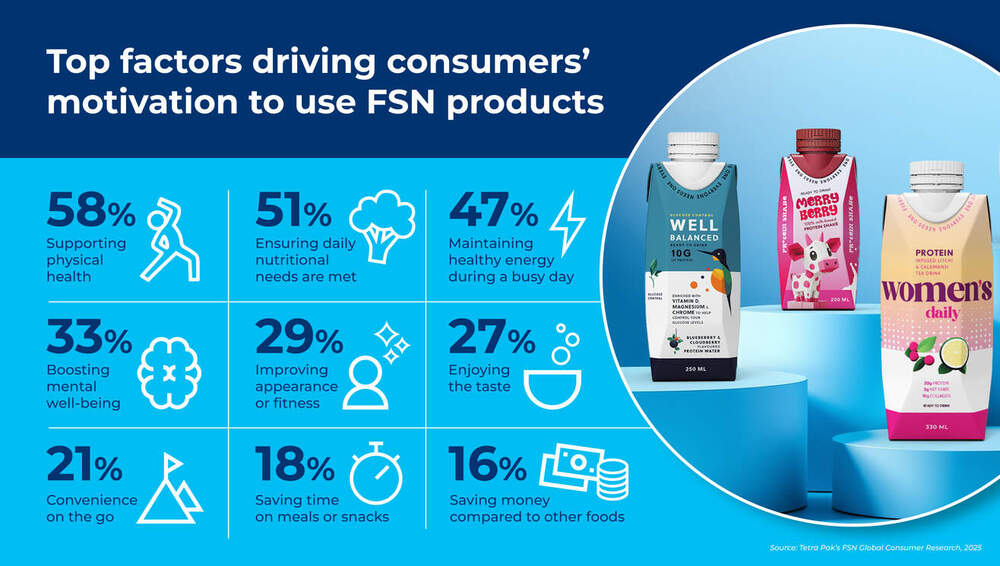As the global nutrition market accelerates toward a projected value of $759bn by 2034, food and beverage brands are being called to rethink how they connect with health-conscious consumers.
According to new research from Tetra Pak, emotional drivers and lifestyle alignment are now just as influential as functional benefits in shaping demand for food supplements and nutrition (FSN) products.
From fortified drinks and protein-enriched beverages to functional supplements, the FSN category is evolving rapidly — and consumers are leading the charge.
Tetra Pak’s global survey reveals that consumers are embracing FSN products as part of a holistic approach to wellbeing. While physical health remains a top motivator (cited by 58%), other key drivers include ensuring daily nutritional intake (51%) and maintaining energy throughout the day (47%). But beyond these functional benefits, emotional reassurance is emerging as a powerful purchase trigger.
42% of consumers say they want to feel more in control of their health39% seek peace of mind about their nutrition30% are looking to feel more balanced or less stressed
These insights suggest that FSN products are about empowerment, calm, and confidence.
Liquid formats are gaining strong traction, with 59% of health-conscious consumers preferring ready-to-drink options for their portability, ease of use, and lack of preparation. Single-serve, shelf-stable formats are particularly well-positioned to meet this demand, especially as 63% of consumers consume FSN products “as is.”
Yet convenience alone won’t win loyalty. Anna Larsson, category leader at Tetra Pak, explains: “Convenience remains a baseline expectation. For brands, it’s a chance to lead with innovative formats that meet evolving expectations and deliver greater value. But interest in this category goes far beyond ease alone.”
Indeed, 71% of consumers say they prefer gradual results from natural ingredients over quick synthetic alternatives — and they’re willing to pay more for it. This signals a clear shift toward value-driven products that support long-term wellbeing.
The research also highlights how different consumer groups prioritise different benefits. Younger adults are drawn to taste and experience, while older consumers seek peace of mind and nutritional assurance. Practical considerations like saving time on meals (18%) and on-the-go convenience (21%) are also rising in importance.
For brand owners, this means developing products that are not only functional and flavourful, but also emotionally resonant and lifestyle-compatible.
Packaging continues to play a critical role in shaping consumer perceptions. Tetra Pak’s study identifies key pain points that packaging can help address — from price sensitivity and trust to ingredient transparency and format convenience. Paper-based carton packaging, for example, offers a sustainable and practical solution that aligns with consumer expectations.
Tetra Pak’s findings indicate that by combining functional benefits with emotional appeal and tailoring products to local preferences, brands can build deeper connections with consumers and unlock new opportunities for growth.
Larsson concludes: “These findings provide a clear direction for brands aiming to grow in a fast-developing FSN market. It’s about creating differentiated offerings that deliver both performance and emotional value — and doing so in formats that fit seamlessly into consumers’ lives.”

